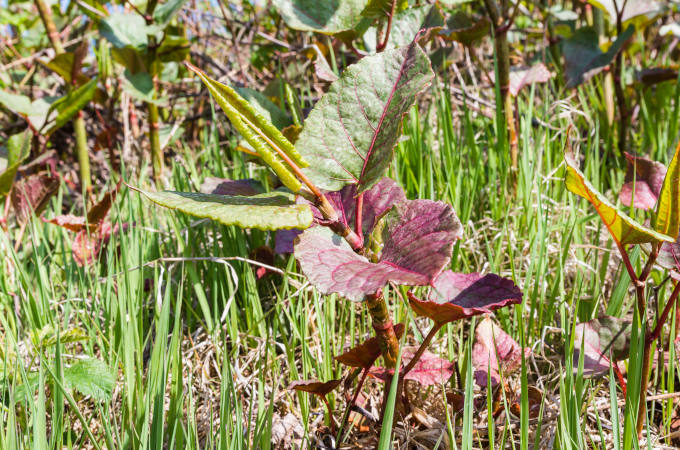
If the offer on your dream house has been accepted, you’ll no doubt be breathing a sigh of relief and looking forward to moving in. But if you’ve done your due diligence and had a Building Survey carried out, any presence of Japanese Knotweed in the garden or vicinity will understandably be a cause for concern. So, how much should you worry if Japanese knotweed has been found on your dream property?
What is Japanese Knotweed?
Japanese knotweed (Fallopia japonica) is an invasive plant species that can cause extensive damage to a property. It spreads rapidly and can grow through cracks in concrete, pavements, walls, drainage systems and building foundations. Even small fragments of stem or root can regenerate into new plants, making it very difficult to fully eradicate.
Originally from Asia, it was introduced to Europe and North America in the 19th century as an ornamental plant. However, its aggressive and resilient nature has enabled it to spread prolifically, especially in urban areas. The UK has particularly widespread infestations, where it is considered a major nuisance plant.
How do you spot this pervasive species?
Identifying Japanese knotweed requires recognising its distinct features. In spring, reddish purple shoots emerge from the ground. These rapidly grow into hollow green stems that resemble bamboo and can reach over 3m tall. The stems have distinctive reddish-purple flecks and produce heart-shaped green leaves up to 15cm long. Clusters of small white flowers bloom in late summer and early autumn. As it dies back in winter, dead brown stems remain standing.
Which type of home is most at risk?
Any home with grounds or located near parks, waterways, railways or neglected land could potentially be affected. Homes built on former industrial or brownfield land are especially at risk. Victorian and Edwardian era homes are disproportionately affected as Japanese knotweed was commonly planted for ornamental purposes during this period, before its invasive nature was realised. Terraced houses are also vulnerable due to close shared walls and boundaries enabling undetected spread between neighbours.
You can use online heatmap trackers to view the prevalence in your area or speak to our team about checking the neighbourhood for potential sources.
How serious is the problem?
Japanese knotweed can seriously undermine structural integrity and lead to large repair bills if left uncontrolled. Its vigorous root system can exploit weaknesses in foundations, walls, drainage systems and other built structures. As well as cracking concrete, it can push up paving slabs and tarmac, requiring replacement. The cost to fully eradicate a typical residential infestation can result in thousands over a 3-5-year period – in fact, according to government figures, the cost of controlling existing Japanese Knotweed infestations lies somewhere in the region of £1.25 billion. Even after treatment, long-time vigilance through monitoring and maintenance is required to prevent regrowth.
How does Japanese knotweed affect property values?
Properties with Japanese knotweed infestations can suffer a reduction in value. In the worst cases where the infestation is severe and widespread on the grounds, the property may be unmortgageable or unsellable altogether until treated. Homeowners must declare any knotweed to potential buyers and lenders also require disclosure, and usually insist on professional treatment plans being in place before granting mortgages. These factors can dampen demand.
What are the legal implications?
The Anti-Social Behaviour Act 2003 and the Wildlife & Countryside Act 1981 provide the legislative framework making it illegal to cause Japanese knotweed to spread into the wild or neighbouring properties. Failure to disclose known knotweed infestations to buyers could open sellers to legal action for misrepresentation, and if allowed to spread to adjoining land, civil action can be brought by affected neighbours to recover removal costs.
What treatment options are available?
As the plant has no natural predators in the UK, there is no reliable biocontrol available. Complete eradication is very rare, so a long-term control plan must be maintained to keep knotweed suppressed. A combination approach is often most effective – cutting back growth then applying herbicide to the stems – and professional treatment is always advisable for best results. Leaving knotweed untreated will likely worsen the infestation as it spreads.
When should professional help be sought?
It is highly advisable to consult knotweed specialists at the first signs of the plant. Attempting DIY treatment without expertise risks worsening the infestation and spreading it to other areas. Licensed professionals can accurately diagnose and advise on the best multi-year treatment plan.
As a potential purchaser, you may well decide to steer clear of any property that has been diagnosed with this difficult plant. That said, it need not be a dealbreaker as long as you’re armed and forewarned. Speak to the team at Squarepoint Surveyors to discuss the findings of your Building Survey or specialist report and let us help you understand the potential implications and ramifications of buying a house with Japanese Knotweed.
